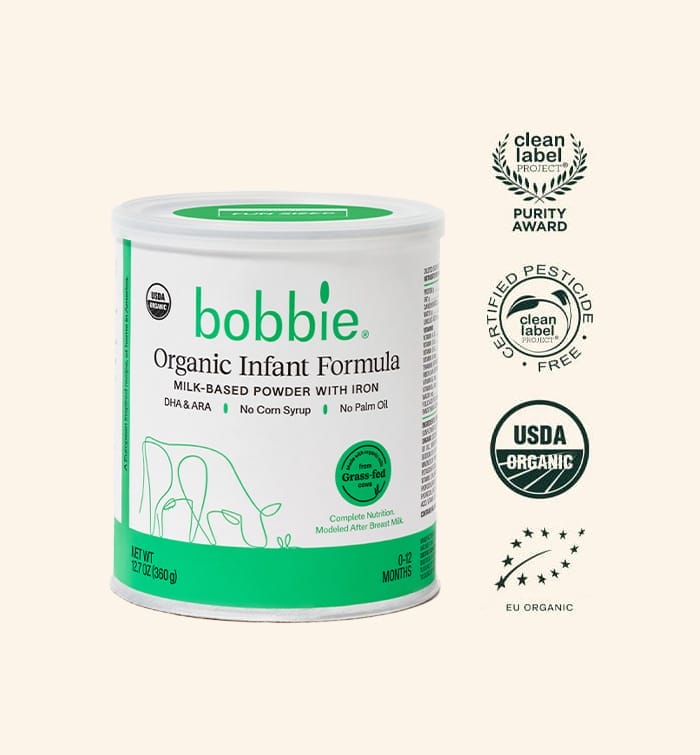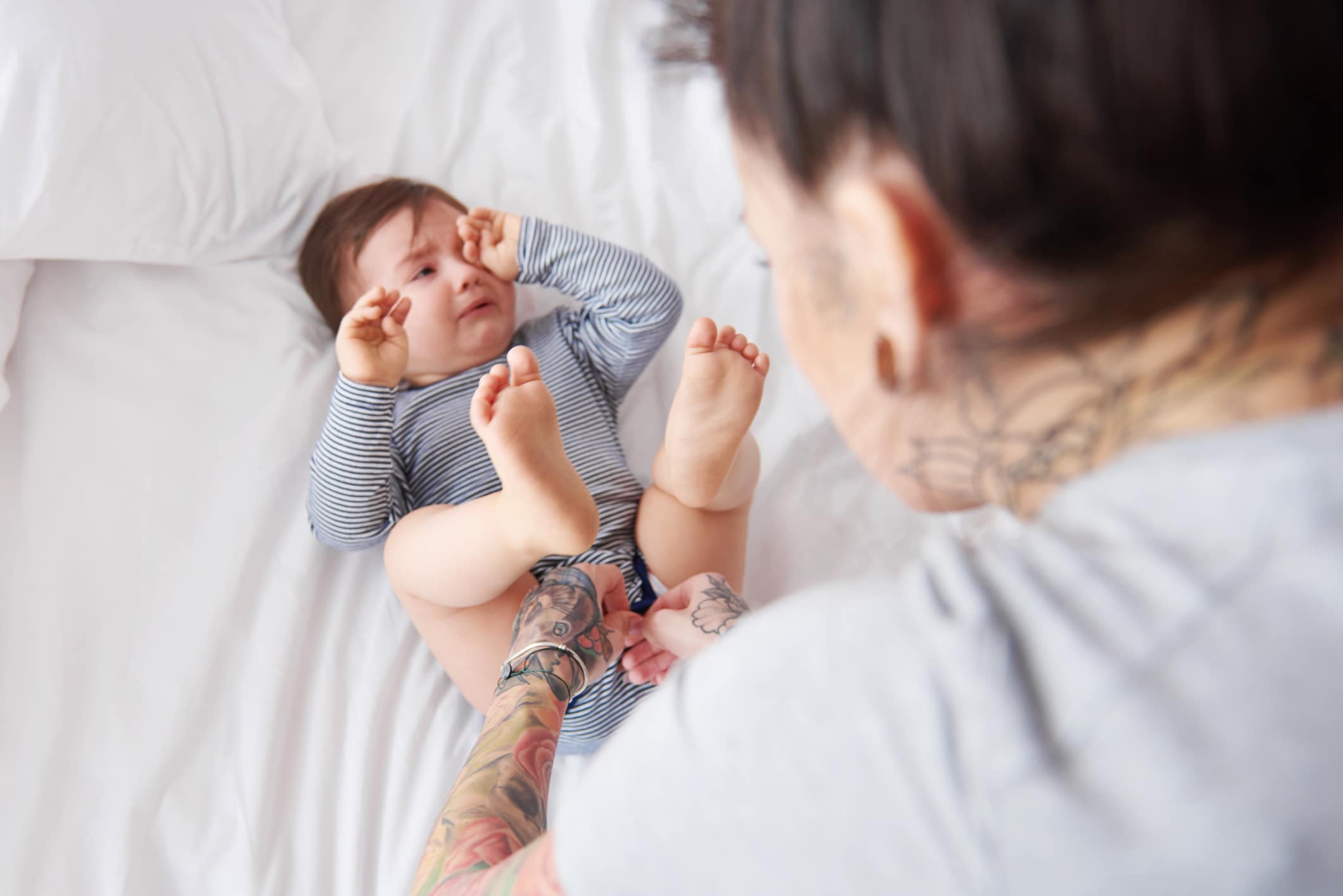We are proud to say that these posts are not sponsored. Our editorial team of Bobbie moms and writers personally select each featured product. If you buy something through our links, we may earn an affiliate commission, at no cost to you.
Who knew so much of being a new parent was tracking your newborn’s every poop? In fact, many maternity wards will require records of baby’s first poop before being discharged. (And mom’s too, but that’s another story.) But what happens once you’re home and your newborn is not pooping? Or if your newborn is not pooping, but passing gas?
We talked to Lauren Crosby, MD, FAAP, and Bobbie Medical Advisor, to cover everything you need to know about why this happens and how to help your baby find relief. You’re certainly not the only parent to ever wonder why is my baby not pooping!
- How often should babies be pooping?
- How long can a baby go without pooping?
- When should I worry about baby poop?
- Breast-fed baby poop vs. formula-fed baby poop
- Signs your baby is constipated
- Signs of constipation
- Does a constipated baby fart?
- Why babies can be gassy and constipated at the same time
- How can I help my baby poop?
- How do you massage a baby to poop?
- What’s the remedy for baby not pooping
- Does gripe water help baby poop?
- Why has my baby not pooped in 2 days?
- When to consult with your pediatrician
How often should babies be pooping?
First, let’s talk newborn poop. Your baby’s first bowel movement will be made up of meconium, a greenish-black, tar-like poop that is formed in the baby’s intestines before birth.
Once the meconium has passed, how often your newborn poops will then depend on whether they are exclusively breastfed or formula-fed, says Dr. Crosby.
“Newborns who are fed breast milk tend to poop more often than formula-fed babies,” she notes. “Breastfed babies poop on average five times per day but a few less or more can be normal as long as the baby is healthy. Formula-fed babies poop less frequently, at least once a day and usually 3-4 times a day.” Once your baby is 6 weeks old, the frequency of a breastfed baby tends to slow down, while formula-fed babies will usually only poop once a day, sometimes less.
And don’t just pay attention to your baby’s poop schedule — poop color can also be an indicator of an issue, or a change in diet, such as starting solid foods.

Shop Bobbie Organic Infant Formula
Bobbie Organic Infant Formula is a USDA Organic, EU-style infant formula that meets all FDA requirements. It is a complete nutrition milk-based powder modeled after breast milk and is easy on tummies. It is non-GMO and doesn't have corn syrup, palm oil, or maltodextrin. Learn more about Bobbie.
How long can a baby go without pooping?
Within 24 hours of being born, all babies should have at least one meconium poop. After that, a baby’s poop schedule can vary, though Crosby notes that a newborn baby not pooping for days could be a sign that he or she isn’t eating enough. If you’re worried about your baby’s pooping frequency, call the doctor or children’s hospital.
“Once it is established that the baby’s intake is fine, if a baby skips a day or two, it’s OK as long as the baby is feeding well and pooping resumes after that,” she says.
When should I worry about baby poop?
If you’re worried about your baby not pooping in two days, don’t freak out just yet. Not pooping for two days is normal, especially for a breastfed infant. It could be due to a change in formula or adding formula to your baby’s diet.
Breast-fed baby poop vs. formula-fed baby poop
Another thing to remember when it comes to newborn poop? Formula-fed babies and breastfed babies tend to have different pooping frequencies.
Exclusively breastfed babies poop more frequently and have less constipation than formula-fed babies, especially in the first two months of life, Crosby says. That’s because breastmilk can be easier on the digestive system.
Signs your baby is constipated
Worried your baby is not pooping? First, it’s important to note that a baby who strains or turns red trying to poop is not necessarily a constipated baby.
“It can be perfectly normal for a baby to exhibit those signs and have normal poops with normal poop patterns,” Crosby says. “Imagine pooping lying on your back. Plus, pooping is a new skill for babies to get used to doing.”
But having a constipated newborn can be stressful for new parents, especially if it’s obvious your baby is uncomfortable having a bowel movement or if you’re worried about how much your baby is eating.
Signs of constipation:
- Fussiness
- Poops are hard or dry
- Straining to poop
- More spit up than usual
- Crying when pooping
Does a constipated baby fart?
Weirdly, yes. Being constipated does not prevent your newborn from farting.
Why babies can be gassy and constipated at the same time
Is your newborn not pooping but passing gas? That’s normal. A constipated baby will likely cry more than usual, which means it could swallow more air, making it gassier. It’s also easier to pass gas than a hard poop, Crosby explains. The build-up of poop in a newborn baby’s intestines can also create more gas, too.
How can I help my baby poop?
First, a constipated baby could be a sign they aren’t eating enough, so it’s important to check in with your pediatrician.
So what is the remedy for a baby who isn’t pooping? With the okay from your pediatrician and if the baby is at least a month old, you can give them a small amount of fruit juice (apple or pear) or chamomile tea, Crosby says.
How do you massage a baby to poop?
Massaging their tummy, giving them a warm bath, and moving baby’s legs in a bicycle motion can help get things moving as well.
What’s the remedy for baby not pooping
Small amount of fruit juice (apple or pear as mentioned above)
Chamomile tea (as mentioned above)
Warm bath
Moving baby’s legs gently in a bicycle motion
Does gripe water help baby poop?
You may want to avoid giving your baby gripe water to try to ease constipation. It’s not a standard remedy for constipation and usually won’t alleviate the problem, Crosby notes.
Why has my baby not pooped in 2 days?
Dr Crosby reminds us that if your baby hasn’t pooped in two days, don’t freak out. It can be normal, especially for a breastfed infant.
When to consult with your pediatrician
While constipation in your newborn is fairly common, there are a few signs that merit you to call the doctor: loss of appetite, bloody poop, pain that doesn’t go away with the usual constipation remedies, or inability to sleep. These could be a sign of a more serious issue.
Having a constipated newborn can be stressful for both parents and baby. But it’s a fairly common issue for newborns, especially for those fed baby formula. Even more confusing? Your baby might be constipated and still passing gas.
But with a few tried-and-true remedies, you can recognize the signs of constipation and help your baby find relief. Then you can feel relieved, too.

Shop Bobbie Organic Infant Formula
Bobbie Organic Infant Formula is a USDA Organic, EU-style infant formula that meets all FDA requirements. It is a complete nutrition milk-based powder modeled after breast milk and is easy on tummies. It is non-GMO and doesn't have corn syrup, palm oil, or maltodextrin. Learn more about Bobbie.

